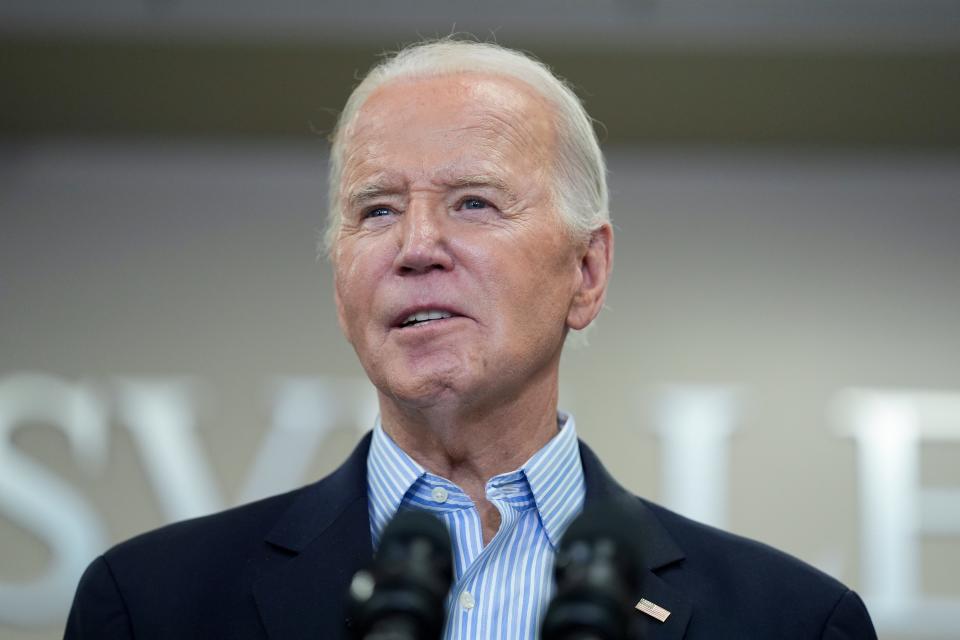Biden sought cease-fire, political victory in Gaza in walkup to State of the Union
WASHINGTON – Just one week ago, President Joe Biden, ice cream cone in hand, signaled a cease-fire between Israel and Hamas could be in place in a matter of days ? a political victory he desperately needed, and one he could taste.
“My national security advisor tells me we’re close,” he said in a Van Leeuwen’s ice cream shop in New York City following an appearance on Late Night With Seth Meyers. “We’re close. It’s not done yet. My hope is by next Monday, we’ll have a cease-fire.”
Not only did the breakthrough fail to happen, but cease-fire negotiations also appear to have stalled, tensions are running high, and conditions in Gaza have deteriorated to the point that the U.S. has begun airdropping food to Palestinians amid warnings of widespread starvation and disease.
For Biden, the elusiveness of a deal to pause fighting and release some of the hostages held by Hamas means he will deliver his State of the Union address on Thursday, the five-month mark of the war, without the benefit of a crucial political victory and a key talking point.
Instead, his administration said ahead of the speech that Biden would announce an emergency military mission to establish a port on the Gaza coast that can receive large ships carrying food, water, medicine, and temporary shelters. Initial shipments will come via Cyprus and will take weeks to execute, according to senior U.S. officials who previewed the plan. It will require U.S. military personnel to assist from vessels offshore, but the operation is not expected to involve American troops on the ground in Gaza, an official said.
Biden is expected to use the high-profile speech before a joint session of Congress to promote the achievements of his first three years in office and to make the case for his vision for the future as he prepares for a rematch with former President Donald Trump in November.
The themes he will touch on will include lowering health care premiums and the cost of prescription drugs, making the wealthy and corporations pay their fair share, protecting women’s reproductive health and uniting the country behind an agenda that includes protecting privacy, curbing fentanyl abuse, helping veterans and ending cancer.
The White House was tight-lipped about how Biden planned to address the conflict in Gaza until the day of his speech. White House press secretary Karine Jean-Pierre said Wednesday the president and his team will continue to work to secure a cease-fire. "That is not going to change just because there's a State of the Union," she said.
The president's comments about Gaza could produce one of the evening’s awkward moments. Progressives and other far-left Democrats, including Rep. Rashida Tlaib, D-Mich., the only Palestinian-American in Congress, are furious over the administration’s handling of the war. Several of them are expected to be on hand for Biden’s speech.
Officials who previewed Biden's remarks to reporters on Thursday on the condition anonymity said the onus is on Hamas to accept the deal that is on the table, which the U.S. says would enable the distribution of humanitarian aid inside Gaza, the release of hostages, including Americans, who were taken during the October attack, and the return of Palestinians to northern Gaza.
Biden will push for a temporary cease-fire and draw attention to the plight of the missing Americans during his address, the officials said Thursday. Hostage family members met with members of Biden's staff on Wednesday and will be present at the president's speech this evening.
More than a speech: 5 things Biden really needs to do in the State of the Union

A breakthrough in the cease-fire talks is not expected before the address. Negotiations resumed in Cairo this week but appeared to be at an impasse on Wednesday, with Israel refusing to send a delegation to the latest round of talks and Hamas refusing to provide a list of which hostages could be released as part of a deal. Hamas has not agreed to release the sick, wounded, elderly and women it is holding, a U.S. official said on Thursday.
The U.S., which is working with Egypt and Qatar to broker an agreement, said last week that Israel has in essence agreed to a six-week pause in fighting in exchange for Hamas releasing up to 40 hostages.
“It’s a rational deal, and the Israelis have been cooperating,” said John Kirby, the White House spokesman for national security issues. “It’s time for Hamas to step up to the plate, take a swing, and let’s get this thing done.”
Biden is hoping for a deal to be in place before the start of the Muslim holy month of Ramadan, which will begin around March 10, depending on the lunar calendar.
His administration has been ramping up the pressure on Hamas to accept the agreement. Vice President Kamala Harris, in some of the administration’s most pointed remarks to date, called for an immediate cease-fire on Sunday, citing the war’s “humanitarian catastrophe.”
"People in Gaza are starving," she said. "The conditions are inhumane, and our common humanity compels us to act.”
The administration also is showing signs of growing frustration with Israeli Prime Minister Benjamin Netanyahu and the Israeli government over its refusal to scale back the war. Harris and senior administration officials met this week in Washington with Benny Gantz, a member of Israel’s wartime cabinet and centrist political rival of Netanyahu.
Though U.S. officials continue to express their support for Israel, the meetings with Gantz were widely viewed as a rebuke of Netanyahu and his prosecution of the war.
Post-war: Netanyahu indicates Israel plans to control Gaza after its war with Hamas ends

Biden, meanwhile, continues to deal with the political fallout over his staunch support of Israel in the war, which started on Oct. 7 after Hamas militants crossed the border into Israel and staged a series of attacks that killed 1,200 Israelis.
Biden is under pressure from Arab Americans, progressive groups and others to demand a cease-fire as the death toll soars.
The Gaza Health Ministry says more than 30,000 Palestinians have died in the war, although its count doesn’t distinguish between civilian and combatant deaths.
Biden’s response to the war has cost him support in his re-election campaign, with the rise of a movement in several states to choose “uncommitted” over him in the presidential primaries. Tlaib is one of the most high-profile voices calling on voters to select "uncommitted."
In this week’s Super Tuesday elections, 19% of voters in Minnesota and nearly 13% in North Carolina chose “uncommitted.” In Michigan last week, more than 100,000 voters, roughly 13%, picked “uncommitted” over Biden, signaling an alarming vulnerability for the incumbent in a crucial swing state.
Biden trails Trump in four new polls released this week, while two others give him a one-point lead.
Given those numbers, the state of Biden's re-election campaign will be on the minds of many Americans when he delivers his State of the Union remarks.
Contributing: Francesca Chambers, White House Correspondent,
Michael Collins covers the White House. Follow him on X, formerly Twitter, @mcollinsNEWS.
A rematch nobody wanted: Big differences define Biden vs. Trump in 2024
This article originally appeared on USA TODAY: Gaza cease-fire top of mind as Biden readies for State of the Union
